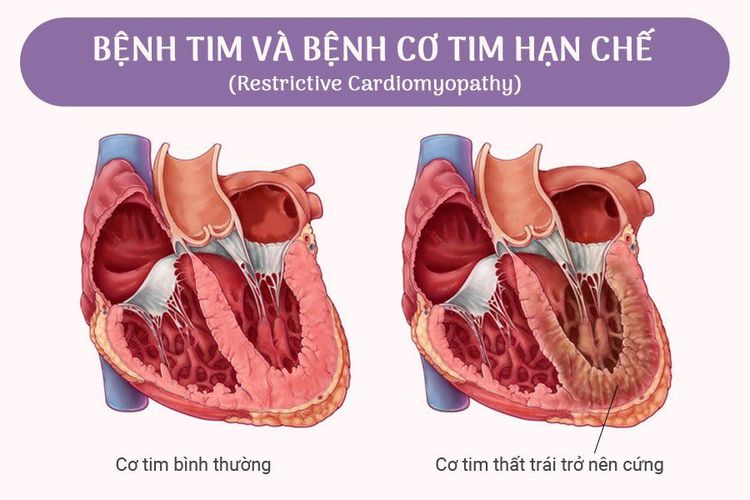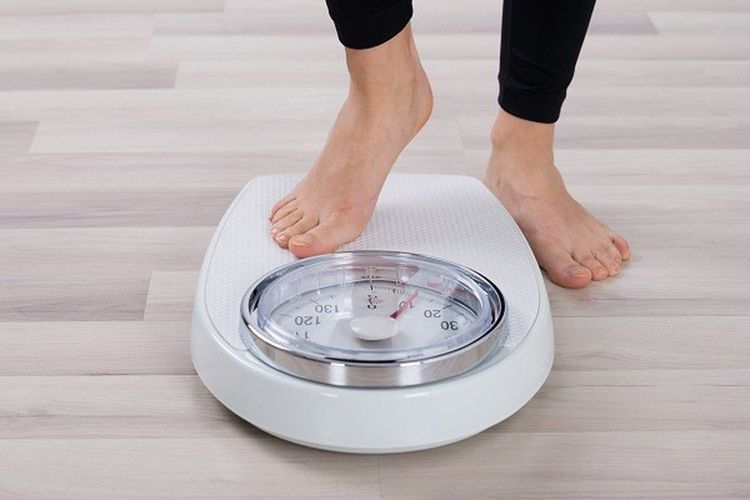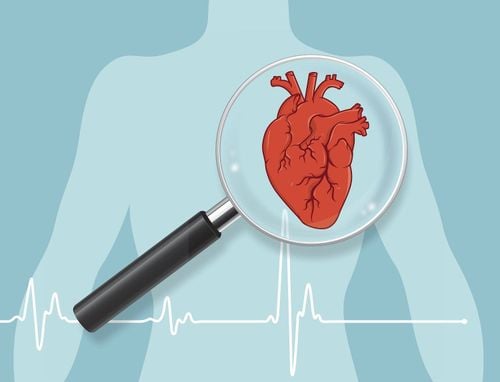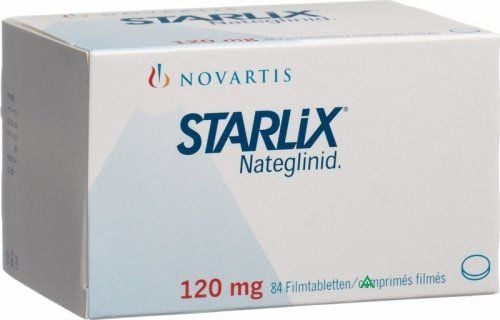This is an automatically translated article.
The article was professionally consulted by Dr. Tran Quoc Tuan - Emergency Medicine Doctor - Emergency Resuscitation Department - Vinmec Phu Quoc International General Hospital.Restrictive cardiomyopathy is cardiomyopathy. With this disease, the heart will have a limited ability to contract because the muscles inside the heart are stiff, so the heart cannot relax completely. The disease makes it harder for the heart to pump enough blood to the organs in the body. Constricted heart muscle will cause heart failure if not treated promptly.
1. Treatment goals for restrictive cardiomyopathy
For the treatment of restrictive cardiomyopathy, people aim at 3 goals including:Treatment of left ventricular diastolic dysfunction. Treatment of heart complications. Treat the cause. 1.1 Treatment of left ventricular diastolic dysfunction In this case, the patient was treated with diuretics for left ventricular diastolic dysfunction, but this drug can reduce the filling pressure in the heart, so it is necessary to treat the left ventricular diastolic dysfunction. Closely monitor the use of diuretics. Patients with restrictive cardiomyopathy are not indicated for the use of inotropic agents.
1.2 Treatment of complications Arrhythmic complications in restrictive cardiomyopathy include: Atrial fibrillation, bradycardia, ventricular arrhythmias. There is also a complication of vascular occlusion, which is treated with lifelong anticoagulation.
1.3 Treating the cause The treatment of the cause is considered the most important in the treatment of restrictive cardiomyopathy as the pathology within the hypertrophic cardiomyopathy, which can be treated by medical and surgical methods. Surgical treatment can be removal of the part causing the narrowing of the blood vessels, replacement of the most atrial valve, heart transplant.

Hình ảnh bệnh cơ tim hạn chế
2. Treatment of restrictive cardiomyopathy
2.1 Medical treatment As mentioned above, diuretics are used in patients with restrictive cardiomyopathy to relieve symptoms of stagnation of peripheral circulation and pulmonary circulation such as circulatory fluid retention, edema, Caution should be exercised with regard to the use of diuretics as it can increase ventricular filling pressures making the disease worse initially. Anticoagulants are used to prevent thromboembolic complications. Antiarrhythmic drugs to reduce arrhythmia complications. ACE inhibitors for acute reduction in blood pressure but still do not increase cardiac output should not be indicated. 2.2 Surgical treatment Interventions or surgery that can be applied in patients with limited cardiomyopathy are as follows:Implantation of a pacemaker for the purpose of regulating the heart rhythm. Implant a defibrillator to stabilize the heart rhythm, prevent arrhythmia complications, especially ventricular fibrillation. Use of ventricular assist devices to create pressure to push blood out of the ventricles. Heart valve surgery by repairing the heart valve or replacing the heart valve to help blood flow better between the chambers of the heart. Heart transplant: This is a new method of heart replacement used for children who already have complications or have pulmonary hypertension. The effectiveness of the heart transplant method depends on the degree of pulmonary hypertension and the degree of complications of the patient after heart transplant.
3. Lifestyle with limited cardiomyopathy symptom control

Cần kiểm tra cân nặng hằng ngày vì nếu có tình trạng suy tim thì việc tăng cân sẽ diễn ra trên bệnh nhân do hiện tượng trữ nước trong cơ th
Check weight daily because if heart failure is present, weight gain will occur on patients due to the phenomenon of water retention in the body. Limit drinking too much water to reduce excess fluid in the body and reduce edema as well as reduce the burden on the heart. According to the instructions, each day should not drink more than 1.5l of water to avoid water retention. Maintain a reasonable exercise regimen, avoid overtraining, which will adversely affect the heart. Have a reasonable portion size, choose heart-healthy foods such as fruits, vegetables, whole grains, milk, low-fat dairy-fermented yogurt, lean meats, and fish. ... Do not eat food too much salt and sugar. Do not use tobacco, do not drink alcohol and stimulants that are harmful to the body. Manage stress, body tension and get enough sleep. Cardiomyopathy has many complex causes, so the treatment of restrictive cardiomyopathy faces many limitations. Therefore, to limit the risk of developing restrictive cardiomyopathy, it is necessary to minimize the risk factors for the disease as well as maintain a healthy lifestyle.
To treat heart-related diseases in children and adults, it is necessary to have a separate treatment based on the cause of the disease. Early diagnosis and strict adherence to the treatment regimen play a very important role, helping to limit the danger of acute myocarditis. In addition, patients also need absolute rest and intensive care by medical staff to minimize complications in the advanced stage of the disease.
Doctor Tran Quoc Tuan has 12 years of experience at Vinh Long General Hospital, Gia Dinh People's Hospital, Nguyen Trai Hospital. Currently working as an Emergency Resuscitation Doctor at Vinmec Phu Quoc International General Hospital.
Vinmec International General Hospital is a leading prestigious medical facility in the field of treatment of cardiovascular diseases, with a team of specialized and experienced medical doctors and a system of modern equipment. support the most effective treatment.
Please dial HOTLINE for more information or register for an appointment HERE. Download MyVinmec app to make appointments faster and to manage your bookings easily.













